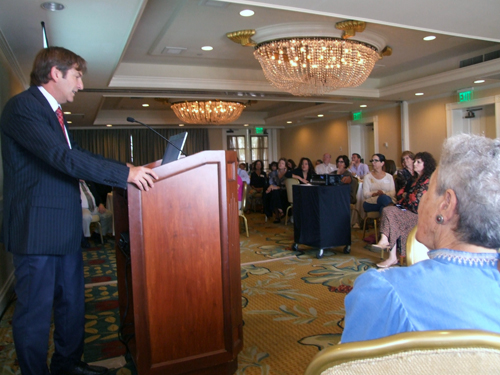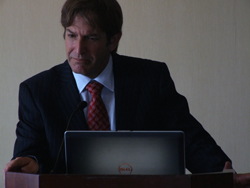
By Donald H. Harrison


CORONADO, California – Tragedies, however horrific, have a way of teaching trauma doctors at the Hadassah Hospital at Ein Kerem in Jerusalem new medical facts and procedures, its chief orthopedic surgeon, Dr. Rami Mosheiff, on Sunday, Oct. 26, told a Southern California gathering of the Hadassah support organization at the Hotel del Coronado.
He told the story of a Palestinian boy who stepped on a landmine and suffered serious injuries to both legs. His left leg had to be amputated, and the right one was seriously torn up. Hadassah doctors were able to use tissue from the amputated leg to repair the other leg in a surgery that Mosheiff described to be “as long as my flight (from Tel Aviv) to San Diego.”
After the surgery and recuperation, the boy’s father took him away, Mosheiff recalled, before doctors had a chance to provide him with a prosthesis for his left leg. Not long afterwards, former Israeli President Ezer Weizman underwent some surgery at Hadassah Hospital and King Hussein of Jordan came to visit him. When the monarch asked if there was anything he could do for the famed hospital, “we asked him to find this boy.” King Hussein did so, and the young man was brought back to the hospital to be fitted with the artificial leg.
During the Intifada, when Palestinian protestors were blowing themselves up in crowds of innocents, one patient came in with a fracture on his wrist and injuries to his belly. When doctors explored, Mosheiff said, they found that the belly injury was a piece of the Palestinian suicide bomber’s body that had lodged within the patient. As his audience collectively shuddered at the thought, the surgeon said that as a result of that incident, “we had to learn to treat against infection.”
Mosheiff said mass casualty events, such as suicide bombings at restaurants and bus stops, sometimes create terrible traffic jams, impeding the transport of patients to the trauma center. So, he said, Hadassah had to learn ways of overcoming these traffic jams to provide medical help in a timely fashion.
He said that the earlier after the traumatic injury, orthopedic surgery can be performed, the better the results. “Patients should be treated almost immediately after a fracture,” he said.
It is not only suicide bombings that break the bones of patients from Israel and its neighbors. “Last winter, we had a storm in the Middle East,” he said. “it was as if we were in Russia. Emergency rooms were filled with patients because we don’t know how to operate in snow—“
“We don’t either,” said one of the Hadassah ladies.
“Within one week, we had more than 250 operations,” Mosheiff said.
During “Operation Protective Edge,” the last war in Gaza, Hadassah surgeons handled three-quarters of the trauma cases, he said. Not all of the surgeries were done at Hadassah Hospital because helicopter pilots calculate where to take patients from Gaza based on their aircraft’s fuel supply. However, Hadassah’s team of three orthopedic specialists traveled to outlying hospitals to help out.
In addition to performing emergency surgeries, the orthopedic team also serves outpatients at its clinics, teaches other doctors, and performs research. For example, he said, the doctors have been learning how to use stem cells from a patient’s own body, and then to concentrate the tissue, and re-implant it in the patient’s bodies.
Mosheiff had served for six years as president of an international association of trauma surgeons based in Europe. Thus far, he said, the boycott, divestment and sanctions (BDS) movement which seeks to isolate Israel has not intruded on Hadassah’s widespread network of international contacts. Mosheiff said he was elected with the support of Arab and Iranian members of the organization from countries which have no formal diplomatic relations with Israel.
Trauma surgeons, he said, “speak the same language. We have the same problems.”
The meeting was presided over by Terri Whitten, the outgoing president of the local San Diego County unit of Hadassah, and Audrey Levine, the incoming president whose term will start in January. The organization presented award to women who have made ongoing financial contributions to Hadassah, and also announced that it would be sponsoring two talks at the upcoming San Diego Jewish Book Fair. One will be at 4 p.m., Nov. 9 at Temple Solel in Cardiff by the Sea featuring Iris Krasnow discussing Sex After: Women Share How Intimacy Changes as Life Changes The other is a noon luncheon, Nov. 13, at the Lawrence Family JCC spotlighting Ayelet Waldman, author of Love and Treasure.
*
Harrison is editor of San Diego Jewish World. He may be contacted via donald.harrison@sdjewishworld.com